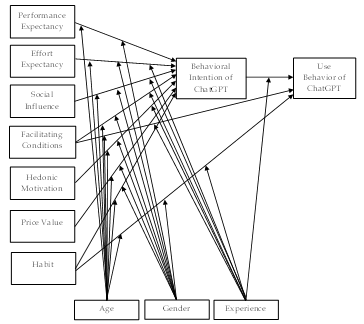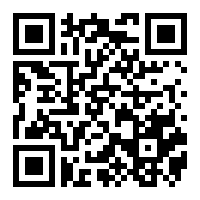Adoption of ChatGPT in Higher Education: Insights from the Unified Theory of Acceptance and Use of Technology Model
DOI:
https://doi.org/10.23917/ijolae.v7i2.9743Keywords:
adaptive learning, ChatGPT, education landscape, learning environment, learning moderated, learning performanceAbstract
Artificial Intelligence (AI) already emerged as a dominant and transformational strength in industry, research, academia, and business. ChatGPT is one example of Generative AI in education that can transform teaching methods and improve users' soft skills. The objective of this research to examine the factors in UTAUT 2 that drive ChatGPT adoption among students in higher education. Data were obtained from questionnaires distributed to 340 higher education students and then analysed using the PLS-SEM method. The results found that age-moderated performance expectations, gender-moderated effort expectations were shown to influence the behavioural intention of using ChatGPT on student learning. Likewise, social influence and habit. The results of this study are expected to add important insights for policy makers in higher education in developing AI technology adoption strategies in accordance with the development and needs of students, given that this is a newly introduced technology.
Downloads
References
Abbas, Muhammad, Farooq Ahmed Jam, and Tariq Iqbal Khan. 2024. “Is It Harmful or Helpful? Examining the Causes and Consequences of Generative AI Usage among University Students.” International Journal of Educational Technology in Higher Education 21(1):1–22. doi: 10.1186/S41239-024-00444-7/TABLES/6.
Alafnan, Mohammad Awad, Samira Dishari, Marina Jovic, and Koba Lomidze. 2023. “ChatGPT as an Educational Tool: Opportunities, Challenges, and Recommendations for Communication, Business Writing, and Composition Courses.” Journal of Artificial Intelligence and Technology 3(2):60–68. doi: 10.37965/JAIT.2023.0184.
Ali Memon, Mumtaz, T. Ramayah, Jun-Hwa Cheah, Hiram Ting, Francis Chuah, and Tat Huei Cham. 2021. “PLS-SEM STATISTICAL PROGRAMS: A REVIEW.” Journal of Applied Structural Equation Modeling 5(1):2590–4221. doi: 10.47263/JASEM.5(1)06.
Alshammari, Sultan Hammad, and Mohammed Habib Alshammari. 2024. “Factors Affecting the Adoption and Use of ChatGPT in Higher Education.” International Journal of Information and Communication Technology Education 20(1). doi: 10.4018/IJICTE.339557.
Annur, Cindy Mutia. 2023. “Survei: ChatGPT Jadi Aplikasi AI Paling Banyak Digunakan Di Indonesia.” Retrieved January 18, 2025 (https://databoks.katadata.co.id/index.php/infografik/2023/06/26/survei-chatgpt-jadi-aplikasi-ai-paling-banyak-digunakan-di-indonesia).
Ansari, Aisha Naz, Sohail Ahmad, and Sadia Muzaffar Bhutta. 2024. “Mapping the Global Evidence around the Use of ChatGPT in Higher Education: A Systematic Scoping Review.” Education and Information Technologies 29(9):11281–321. doi: 10.1007/S10639-023-12223-4/TABLES/1.
Baidoo-Anu, David, and Leticia Owusu Ansah. 2023. “Education in the Era of Generative Artificial Intelligence (AI): Understanding the Potential Benefits of ChatGPT in Promoting Teaching and Learning.” SSRN Electronic Journal. doi: 10.2139/SSRN.4337484.
Baskara, F. R., Puri, A. D., & Wardhani, A. R. (2023). ChatGPT and the Pedagogical Challenge: Unveiling the impact on early-Career academics in Higher Education. Indonesian Journal on Learning and Advanced Education (IJOLAE), 5(3), 311-322.
Bazelais, Paul, David J. Lemay, and Tenzin Doleck. 2024. “User Acceptance and Adoption Dynamics of ChatGPT in Educational Settings.” Eurasia Journal of Mathematics, Science and Technology Education 20(2):em2393. doi: 10.29333/EJMSTE/14151.
Bonsu, Emmanuel Mensah, and Daniel Baffour-Koduah. 2023. “From the Consumers’ Side: Determining Students’ Perception and Intention to Use ChatGPT in Ghanaian Higher Education.” Journal of Education, Society & Multiculturalism 4(1):1–29. doi: 10.2478/JESM-2023-0001.
Boscardin, Christy K., Brian Gin, Polo Black Golde, and Karen E. Hauer. 2024. “ChatGPT and Generative Artificial Intelligence for Medical Education: Potential Impact and Opportunity.” Academic Medicine 99(1):22–27. doi: 10.1097/ACM.0000000000005439.
Celik, Ismail. 2023. “Towards Intelligent-TPACK: An Empirical Study on Teachers’ Professional Knowledge to Ethically Integrate Artificial Intelligence (AI)-Based Tools into Education.” Computers in Human Behavior 138:107468. doi: 10.1016/J.CHB.2022.107468.
Dahri, Nisar Ahmed, Noraffandy Yahaya, Waleed Mugahed Al-Rahmi, Ahmed Aldraiweesh, Uthman Alturki, Sultan Almutairy, Anna Shutaleva, and Rahim Bux Soomro. 2024. “Extended TAM Based Acceptance of AI-Powered ChatGPT for Supporting Metacognitive Self-Regulated Learning in Education: A Mixed-Methods Study.” Heliyon 10(8):e29317. doi: 10.1016/J.HELIYON.2024.E29317/ATTACHMENT/3CC3CE75-4976-42A2-9282-5CD7B002BC9E/MMC1.DOCX.
Farida, Florentina Anif, Yustinus Budi Hermanto, Ardianus Laurens Paulus, and Herdina Tyas Leylasari. 2022. “Strategic Entrepreneurship Mindset, Strategic Entrepreneurship Leadership, and Entrepreneurial Value Creation of SMEs in East Java, Indonesia: A Strategic Entrepreneurship Perspective.” Sustainability 2022, Vol. 14, Page 10321 14(16):10321. doi: 10.3390/SU141610321.
Gansser, Oliver Alexander, and Christina Stefanie Reich. 2021. “A New Acceptance Model for Artificial Intelligence with Extensions to UTAUT2: An Empirical Study in Three Segments of Application.” Technology in Society 65:101535. doi: 10.1016/J.TECHSOC.2021.101535.
Grassini, Simone, Maren Linnea Aasen, and Anja Møgelvang. 2024. “Understanding University Students’ Acceptance of ChatGPT: Insights from the UTAUT2 Model.” Applied Artificial Intelligence 38(1). doi: 10.1080/08839514.2024.2371168.
Habibi, Akhmad, Muhaimin Muhaimin, Bernadus Kopong Danibao, Yudha Gusti Wibowo, Sri Wahyuni, and Ade Octavia. 2023. “ChatGPT in Higher Education Learning: Acceptance and Use.” Computers and Education: Artificial Intelligence 5:100190. doi: 10.1016/J.CAEAI.2023.100190.
Hair, J., R. Anderson, B. Black, and B. Babin. 2016. “Multivariate Data Analysis.”
Hair, Joe F., Matthew C. Howard, and Christian Nitzl. 2020. “Assessing Measurement Model Quality in PLS-SEM Using Confirmatory Composite Analysis.” Journal of Business Research 109:101–10. doi: 10.1016/J.JBUSRES.2019.11.069.
Hair, Joseph F., Jeffrey J. Risher, Marko Sarstedt, and Christian M. Ringle. 2019. “When to Use and How to Report the Results of PLS-SEM.” European Business Review 31(1):2–24. doi: 10.1108/EBR-11-2018-0203/FULL/XML.
Hoi, Vo Ngoc. 2020. “Understanding Higher Education Learners’ Acceptance and Use of Mobile Devices for Language Learning: A Rasch-Based Path Modeling Approach.” Computers & Education 146:103761. doi: 10.1016/J.COMPEDU.2019.103761.
Huang, Chi Yo, and Yu Sheng Kao. 2015. “UTAUT2 Based Predictions of Factors Influencing the Technology Acceptance of Phablets by DNP.” Mathematical Problems in Engineering 2015. doi: 10.1155/2015/603747.
Kasneci, Enkelejda, Kathrin Sessler, Stefan Küchemann, Maria Bannert, Daryna Dementieva, Frank Fischer, Urs Gasser, Georg Groh, Stephan Günnemann, Eyke Hüllermeier, Stepha Krusche, Gitta Kutyniok, Tilman Michaeli, Claudia Nerdel, Jürgen Pfeffer, Oleksandra Poquet, Michael Sailer, Albrecht Schmidt, Tina Seidel, Matthias Stadler, Jochen Weller, Jochen Kuhn, and Gjergji Kasneci. 2023. “ChatGPT for Good? On Opportunities and Challenges of Large Language Models for Education.” Learning and Individual Differences 103:102274. doi: 10.1016/J.LINDIF.2023.102274.
Khan, Muhammad Talha, Muhammad Dawood Idrees, Muhammad Rauf, Abdul Sami, Arsalan Ansari, and Atif Jamil. 2022. “Green Supply Chain Management Practices’ Impact on Operational Performance with the Mediation of Technological Innovation.” Sustainability 2022, Vol. 14, Page 3362 14(6):3362. doi: 10.3390/SU14063362.
Lo, Chung Kwan. 2023. “What Is the Impact of ChatGPT on Education? A Rapid Review of the Literature.” Education Sciences 13(4):410. doi: 10.3390/EDUCSCI13040410/S1.
Maulana, Muhammad Jafar, Cecep Darmawan, and Rahmat. 2023. “Penggunaan ChatGPT Dalam Pendidikan Berdasarkan Perspektif Etika Akademik.” Bhineka Tunggal Ika: Kajian Teori Dan Praktik Pendidikan PKN.
Osei, Hannah Vivian, Kwame Owusu Kwateng, and Kofi Agyenim Boateng. 2022. “Integration of Personality Trait, Motivation and UTAUT 2 to Understand e-Learning Adoption in the Era of COVID-19 Pandemic.” Education and Information Technologies 27(8):10705–30. doi: 10.1007/S10639-022-11047-Y/TABLES/6.
Purbonuswanto, W., Sutama, S., Supriadi, D., Adnan, M. B., & Waluyo, M. (2024). Transforming Educational Leadership: Digital Applications of Ki Hajar Dewantara’s Leadership Principles. Indonesian Journal on Learning and Advanced Education (IJOLAE), 422-437.
Rahmawati, N., Prasetiyo, W. H., Wicaksono, R. B., Muthali'in, A., Huda, M., & Atang, A. (2022). Pemanfaatan Sudut Baca dalam Meningkatkan Literasi Kewarganegaraan Siswa di Era Digital. Buletin KKN Pendidikan, 4(1), 99-107.
Rasul, Tareq, Sumesh Nair, Diane Kalendra, Mulyadi Robin, Fernando de Oliveira Santini, Wagner Junior Ladeira, Mingwei Sun, Ingrid Day, Raouf Ahmad Rather, and Liz Heathcote. 2023. “The Role of ChatGPT in Higher Education: Benefits, Challenges, and Future Research Directions.” Journal of Applied Learning and Teaching 6(1):41–56. doi: 10.37074/JALT.2023.6.1.29.
Raza, Syed Ali, Zubaida Qazi, Wasim Qazi, and Maiyra Ahmed. 2022. “E-Learning in Higher Education during COVID-19: Evidence from Blackboard Learning System.” Journal of Applied Research in Higher Education 14(4):1603–22. doi: 10.1108/JARHE-02-2021-0054/FULL/XML.
Stockman, Caroline, and Emma Nottingham. 2022. “Surveillance Capitalism in Schools: What’s the Problem?” Digital Culture & Education 14(1):2022.
Strzelecki, Artur. 2023. “To Use or Not to Use ChatGPT in Higher Education? A Study of Students’ Acceptance and Use of Technology.” Interactive Learning Environments. doi: 10.1080/10494820.2023.2209881.
Strzelecki, Artur. 2024. “Students’ Acceptance of ChatGPT in Higher Education: An Extended Unified Theory of Acceptance and Use of Technology.” Innovative Higher Education 49(2):223–45. doi: 10.1007/S10755-023-09686-1/TABLES/4.
Strzelecki, Artur, Karina Cicha, Mariia Rizun, and Paulina Rutecka. 2024. “Acceptance and Use of ChatGPT in the Academic Community.” Education and Information Technologies 29(17):22943–68. doi: 10.1007/S10639-024-12765-1/TABLES/5.
Tao, Wenjuan, Jinming Yang, and Xing Qu. 2024. “Utilization of, Perceptions on, and Intention to Use AI Chatbots Among Medical Students in China: National Cross-Sectional Study.” JMIR Medical Education 10(1):e57132. doi: 10.2196/57132.
Venkatesh, Viswanath, Michael G. Morris, Gordon B. Davis, and Fred D. Davis. 2003. “User Acceptance of Information Technology: Toward a Unified View.” MIS Quarterly: Management Information Systems 27(3):425–78. doi: 10.2307/30036540.
Venkatesh, Viswanath, Jamea y. .. Thong, and Xin Xu. 2012. “Consumer Acceptance and Use of Information Technology: Extending the Unified Theory of Acceptance and Use of Technology by Viswanath Venkatesh, James Y.L. Thong, Xin Xu :: SSRN.” MIS Quarterly 36(1):157–78.
Wang, K ;, Q ; Ruan, X ; Zhang, C ; Fu, B Duan, Kai Wang, Qianqian Ruan, Xiaoxuan Zhang, Chunhua Fu, and Boyuan Duan. 2024. “Pre-Service Teachers’ GenAI Anxiety, Technology Self-Efficacy, and TPACK: Their Structural Relations with Behavioral Intention to Design GenAI-Assisted Teaching.” Behavioral Sciences 2024, Vol. 14, Page 373 14(5):373. doi: 10.3390/BS14050373.
Weizenbaum, Joseph. 1966. “ELIZA-A Computer Program for the Study of Natural Language Communication between Man and Machine.” Communications of the ACM 9(1):36–45. doi: 10.1145/365153.365168/ASSET/52A33E60-61E1-440C-8557-F51EDCC5D9BF/ASSETS/365153.365168.FP.PNG.
Zacharis, Georgios, and Kleopatra Nikolopoulou. 2022. “Factors Predicting University Students’ Behavioral Intention to Use ELearning Platforms in the Post-Pandemic Normal: An UTAUT2 Approach with ‘Learning Value.’” Education and Information Technologies 27(9):12065–82. doi: 10.1007/S10639-022-11116-2/FIGURES/2.

Submitted
Accepted
Published
Issue
Section
License
Copyright (c) 2025 Syahara Inda Wahdah, Riza Yonisa Kurniawan, Nico Irawan

This work is licensed under a Creative Commons Attribution 4.0 International License.












